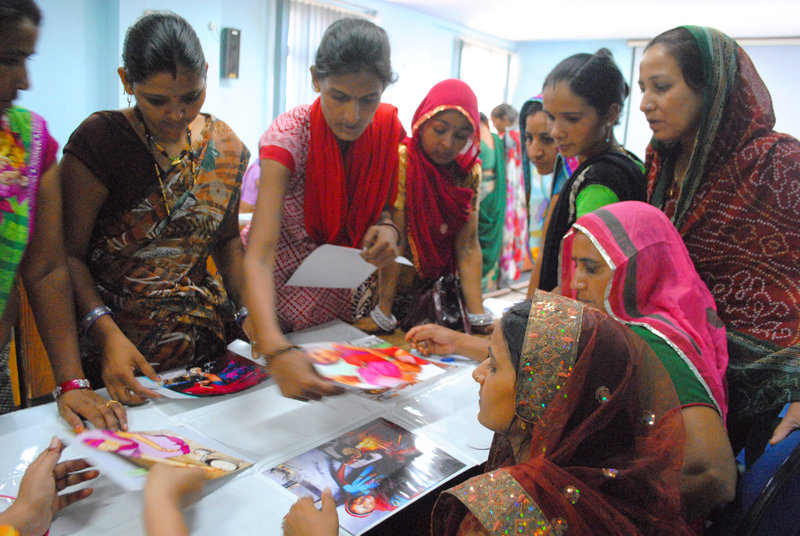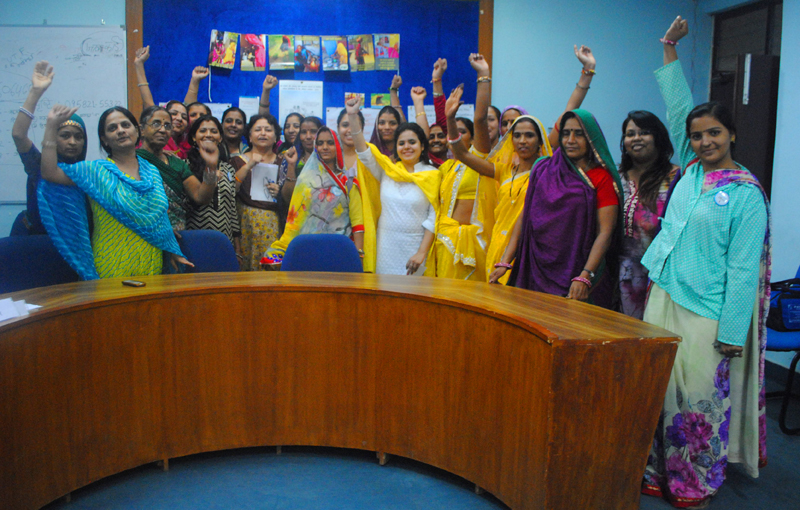A team of three CSR representatives Ritika Bhatia, Pratishtha Arora and Arnika Singh reached Jaipur on 22nd June to conduct the second ‘Training of Trainers’ under HSF Water Conservation and Climate Change programme with elected women representatives.


This time the training was organised at the Indira Gandhi Panchayati Raj and GraminVikasSansthan, Jaipur. IGPRS is an autonomous organization working for the development of panchayati raj and rural areas. With the support and coordination of Mr. Rajeshwar Singh (Director General, IGPRS) and Dr. Anita Brandon (Professor, IGPRS) the training programme was hosted at this institute.
As a part of the manual, the four day training was shot and video documented too. This would be compiled as video equivalent to the training manual and would be further distributed to the participants of all the TOTs.
On 23rd June 2015, the first day of the training, the participant group of this residential reached the institute and soon began the introduction. The facilitators from CSR along with Mrs. RichaAudichya (Local Expert) introduced themselves to the group followed by introduction of the participants.
CECOEDECON and SIDART, both organisations from Jaipur were the local partners of this training programme and supported the participation of the Sarpanchs, Ward Panch/ Members, Village Volunteers, Active Community Members, from areas like Phagi, Chaksu, Sanganer, Thikariya etc.
The first day of the training was spent on building the understanding on gender roles, stereotypes framework etc. This is purposely structured so as to make the participants look at water conservation and climate change through the gender lens. As we move towards our session on Leadership and Governance for the women representatives, the group automatically connects with the content. With activities like Tangram, Three generational Change etc. the group was actively engaged throughout the day.


The night session were kept for a discussion on a documentary that summed up the whole day’s content. Impossible Dream, an animated documentary that narrates a brilliant comparison between the lives of a man and a woman.
From the second day the training shifted its focus towards water issues in Rajasthan. Beginning with the recap of second day, the day started with a session on roles and responsibilities of WER’s. Mr. Bhanwar Lal (Secretary, Gram Panchayat) facilitated these sessions and continued with Water and Climate Change conditions. He started with the global statistics on safe drinking water and then narrowed down his talk to the situation in rural Rajasthan, Sanganer and Sirohi district.
It was important to identify the local issues that the elected leaders were facing in their respective Panchayats and to address these we had MsRicha and Mr. Bhanwar Lal to answer all the queries.
The third day was allotted for the field visit which we made at Kumhariya Vas Panchayat. We had Uma Sharma (Sarpanch0 with us throughout the training and were lucky to have her facilitate a session on how her area had been dealing with water shortage.
Resource Mapping, an extremely important and effective activity was conducted for the participants to build their understanding on water resources in the villages.
During the four day training, the participants were also asked to give a demo of the training that they have received and were also shown videos to summarize the information and activities during the days. These sessions were generally conducted during the evenings to keep them light and more interactive.
We were joined by Dr. Ranjana Kumari and Ms. UshaSubramaniam on the third day of this training programme. Two groups from the participants prepared street plays based on their understanding of the content. The plays very well scripted and presented by both the groups following which Dr. Ranjana Kumari had a brief conversation on how the society has been modifying and stereotyping the roles of men and women.
On the last day, the participants were made to understand different schemes that the government has taken out for the benefit of communities. It was important that the leaders identify the schemes that can be help their panchayats in all the manners possible.
During the closing ceremony, the resource kits were distributed and the participants were made aware of the communication nitty gritty that they should keep in mind while they are conducting the trainings.
The training programme was concluded with brief notes by Mr. Rajeshwar Singh, Dr. Ranjana Kumari and Dr. Anita Brandon.
Looking forward to reading your blogs, you can mail us your entries at WriteWithUs@csrindia.org, or upload them at Write With Us.
Donation for Centre for Social Research to Join our effort in rehabilitating Domestic Violence
Discuss this article on Facebook




